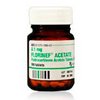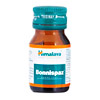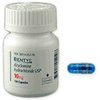INDICATIONS
Prilosec is used for treating heartburn or irritation of the esophagus caused by gastroesophageal reflux disease (GERD). It may also be used for short-term treatment of ulcers of the stomach or small intestines. It may also be used with certain antibiotics to treat ulcers of the small intestines and to help prevent them from coming back. It may also be used to treat conditions that cause your body to make too much stomach acid (eg, Zollinger-Ellison syndrome). Prilosec is a proton pump inhibitor (PPI). It works by decreasing the amount of acid produced in the stomach.
INSTRUCTIONS
Use Prilosec as directed by your doctor.
- Take Prilosec by mouth on an empty stomach before eating.
- Swallow Prilosec whole. Do not break, crush, chew, or open Prilosec before swallowing.
- If you have trouble swallowing the capsule, add 1 tablespoon of applesauce to an empty bowl. Open the capsule and empty the pellets onto the applesauce. Mix the pellets with the applesauce and swallow the mixture at once, followed by a glass of cool water. The applesauce used should not be hot and should be soft enough to be swallowed with out chewing. Do not chew or crush the pellets. Do not store the mixture for further use.
- You may take antacids while you are using Prilosec if you are directed to do so by your doctor.
- If you also take an imidazole antifungal (eg, ketoconazole), take it at least 2 hours before taking Prilosec.
- If you also take sucralfate, take Prilosec at least 30 minutes before taking sucralfate.
- Continue to take Prilosec even if you feel well. Do not miss any doses.
- If you miss a dose of Prilosec, take it as soon as possible. If it is almost time for your next dose, skip the missed dose and go back to your regular dosing schedule. Do not take 2 doses at once.
Ask your health care provider any questions you may have about how to use Prilosec.
MORE INFO:
Active Ingredient: Omeprazole.
STORAGE
Store Prilosec at room temperature, between 59 and 86 degrees F (15 and 30 degrees C). Store away from heat, moisture, and light. Do not store in the bathroom. Keep Prilosec out of the reach of children and away from pets.
Do NOT use Prilosec if:
- you are allergic to any ingredient in Prilosec
- you are taking an HIV protease inhibitor (eg, atazanavir).
Contact your doctor right away if any of these apply to you.
Some medical conditions may interact with Prilosec. Tell your doctor or pharmacist if you have any medical conditions, especially if any of the following apply to you:
- if you are pregnant, planning to become pregnant, or are breast-feeding
- if you are taking any prescription or nonprescription medicine, herbal preparation, or dietary supplement
- if you have allergies to medicines, foods, or other substances
- if you have liver problems or stomach or bowel cancer.
Some medicines may interact with Prilosec. Tell your health care provider if you are taking any other medicines, especially any of the following:
- Clarithromycin or voriconazole because they may increase the risk of Prilosec's side effects
- Anticoagulants (eg, warfarin), benzodiazepines (eg, diazepam), cilostazol, cyclosporine, digoxin, disulfiram, phenytoin, or tacrolimus because the risk of their side effects may be increased by Prilosec
- Ampicillins, azole antifungals (eg, ketoconazole), clopidogrel, ginkgo biloba, HIV protease inhibitors (eg, atazanavir), or iron because their effectiveness may be decreased by Prilosec.
This may not be a complete list of all interactions that may occur. Ask your health care provider if Prilosec may interact with other medicines that you take. Check with your health care provider before you start, stop, or change the dose of any medicine.
Important safety information:
- Prilosec may cause drowsiness or dizziness. These effects may be worse if you take it with alcohol or certain medicines. Use Prilosec with caution. Do not drive or perform other possible unsafe tasks until you know how you react to it.
- Contact your doctor if you have any symptoms of a bleeding ulcer, such as black, tarry stools or vomit that looks like coffee grounds, or if you experience throat pain, chest pain, severe stomach pain, or trouble swallowing.
- Prilosec may interfere with certain lab tests. Be sure your doctor and lab personnel know you are taking Prilosec.
- Prilosec should be used with caution in Asian patients; the risk of side effects may be increased in these patients.
- Prilosec should be used with extreme caution in children younger than 2 years old; safety and effectiveness in these children have not been confirmed.
- Pregnancy and breast-feeding: If you become pregnant, contact your doctor. You will need to discuss the benefits and risks of using Prilosec while you are pregnant. Prilosec is found in breast milk. Do not breastfeed while taking Prilosec.
All medicines may cause side effects, but many people have no, or minor, side effects.
Check with your doctor if any of these most common side effects persist or become bothersome:
Diarrhea; headache.
Seek medical attention right away if any of these severe side effects occur:
Severe allergic reactions (rash; hives; itching; difficulty breathing; tightness in the chest; swelling of the mouth, face, lips, or tongue; unusual hoarseness); chest pain; dark urine; fast or irregular heartbeat; fever, chills, or sore throat; red, swollen, blistered, or peeling skin; swelling of the hands, ankles, or feet; unusual bruising or bleeding; unusual tiredness; vision changes; yellowing of the eyes or skin.
This is not a complete list of all side effects that may occur. If you have questions about side effects, contact your health care provider.
 FlorinefFlorinef is used for treating adrenocortical insufficiency in Addison disease and for treating salt-losing adrenogenital syndrome.as low as $1.18
FlorinefFlorinef is used for treating adrenocortical insufficiency in Addison disease and for treating salt-losing adrenogenital syndrome.as low as $1.18 BiaxinBiaxin is used to treat many different types of bacterial infections affecting the skin and respiratory system. It is also used together with other medicines to treat stomach ulcers caused by Helicobacter pylori.as low as $2.67
BiaxinBiaxin is used to treat many different types of bacterial infections affecting the skin and respiratory system. It is also used together with other medicines to treat stomach ulcers caused by Helicobacter pylori.as low as $2.67 BonnispazBonnispaz is used to treat colic of various etiologies.as low as $8.64
BonnispazBonnispaz is used to treat colic of various etiologies.as low as $8.64 MotiliumMotilium is used for stopping feelings of sickness (nausea) and being sick (vomiting) in adults and children. It is also used for relieving stomach discomfort, fullness or bloating and regurgitation of stomach contents (reflux or heartburn) in adults.as low as $0.3
MotiliumMotilium is used for stopping feelings of sickness (nausea) and being sick (vomiting) in adults and children. It is also used for relieving stomach discomfort, fullness or bloating and regurgitation of stomach contents (reflux or heartburn) in adults.as low as $0.3 BentylBentyl is used for the treatment of functional bowel/irritable bowel syndrome.as low as $0.44
BentylBentyl is used for the treatment of functional bowel/irritable bowel syndrome.as low as $0.44 LasunaLasuna or Garlic, as it is more commonly known, is a potent herb helpful in preventing hypercholesterolemia.as low as $38.64
LasunaLasuna or Garlic, as it is more commonly known, is a potent herb helpful in preventing hypercholesterolemia.as low as $38.64